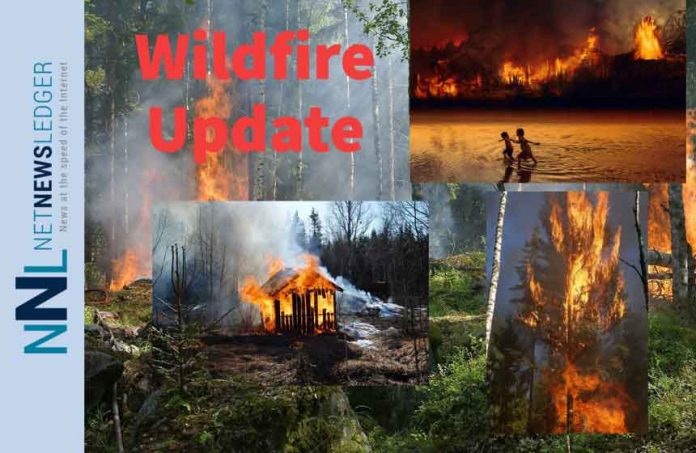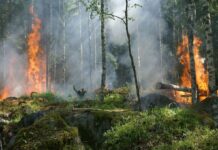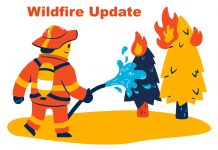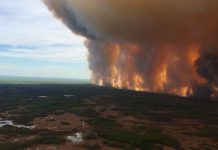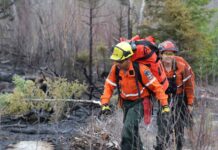EDMONTON – WILDFIRE UPDATE – Alberta recorded just three new wildfires over the past 24 hours, but warmer conditions in the forecast may lead to heightened wildfire danger and activity in the coming days.
The evacuation order in Jasper and Jasper National Park remains in effect. The conditions in the town of Jasper remain hazardous not only due to fire damage, but also risk from the fires in the area.
Evacuation orders and alerts:
- The Municipal District of Bighorn’s evacuation order for the North Ranchlands area remains in effect. An evacuation alert is also in effect for residents west of Water Valley, Doc Mills Road (Range Road 62A), Whispering Pines Road (Township Road 294A), and Burnt Timber Road.
- Affected residents should monitor the Municipal District of Bighorn’s website and Facebook page for updates on fire activity and evacuation information.
- An evacuation order for Jasper and Jasper National Park remains in effect. Reception centres in Grande Prairie, Calgary and Edmonton are providing support to evacuees:
- Grande Prairie reception centre: Holiday Inn and Suites, 9816 107 Street.
- Calgary reception centre: Shouldice Arena, 1515 Home Road NW.
- Edmonton reception centre: Kennedale Site Building 2, 12814 58 Street.
- The Municipality of Jasper and Parks Canada are sharing information about re-entry as it becomes available.
- Evacuation orders for Little Red River Cree Nation (John D’or Prairie, Fox Lake and Garden River) remain in effect. The First Nation has confirmed re-entry planning is well underway.
- The Municipal District of Opportunity’s evacuation order for Chipewyan Lake is still in place.
- Alberta Emergency Alerts are issued by local authorities and are updated at their discretion. For the best source of information on the status of evacuation orders and alerts, residents are encouraged to follow their local authorities’ preferred communication channels for updates.
- Albertans are encouraged to download the Alberta Emergency Alert mobile app, which immediately pushes all alerts out to subscribers.
- Evacuees can also call the Government of Alberta contact centre at 310-4455 for assistance.
Current situation
- There are 117 wildfires currently burning across Alberta in the Forest Protection Area.
- 23 are classified as out of control, 45 are being held, 49 are under control.
- The response is focused on the wildfires that pose a direct threat to human life, communities, critical infrastructure and major industrial facilities.
- According to Parks Canada, the wildfire in Jasper National Park remains classified as out of control and is expected to become more active over the coming days with warmer weather.
- Fires in town have been extinguished.
- Alberta’s government is supporting Parks Canada in developing wildfire strategies and tactics and overseeing the use of Alberta crews and equipment.
- Crews and heavy equipment are working on hotspots next to the townsite and other important structures like the Jasper Park Lodge.
- The Canadian military is mobilized and will also support firefighting efforts in Jasper and Jasper National Park.
- This wildfire is estimated at about 32,000 hectares.
- CWF507 burning about 25 kilometres west of Water Valley is now classified as being held at 65 hectares in size.
- The Semo Complex Fire (HWF061) near Little Red River Cree Nation is classified as out of control at more than 97,000 hectares in size.
- It is approximately 2.2 kilometres from Highway 58, 13 kilometres from Garden River, 19 kilometres from John D’Or Prairie and 15 kilometres from Fox Lake.
- Rainfall over the weekend helped reduce fire activity and allowed crews to make good progress on suppressing wildfires in this complex.
- An evacuation order is also in place for Chipewyan Lake.
- Since Jan.1, there have been 995 wildfires in the Forest Protection Area, burning more than 560,000 hectares.
- Almost 1,900 Alberta firefighters and support staff are currently working in the province.
- In addition to provincial resources, Alberta has imported firefighters, support staff and equipment from other jurisdictions to support wildfire response and suppression efforts.
- More than 200 South African firefighters arrived the morning of July 29, and support from New Zealand arrived the morning of July 30.
- Additional crews from Quebec are arriving today.
- Although lightning has caused more than half of wildfires burning today, the remaining fires are caused by people. Albertans are urged to prevent any additional fire starts that will add to the already extreme wildfire danger in the southern part of the province.
- Air tankers may use water from nearby lakes to fight wildfires. If you are in the water and see an aircraft coming to collect water, please move to the shore. Failing to do so impedes firefighting efforts. Albertans who do not comply could face a mandatory court appearance.
- Information about wildfires can be found by visiting the Alberta Wildfire Status Dashboard.
Fire bans
- Thanks to cooler temperatures and precipitation over the weekend, the fire ban will only remain in place for the southern and northernmost areas of the province. Grande Prairie, Edson and parts of the Whitecourt Forest Area have moved to a fire restriction, and Peace River is now under a fire advisory. Please confirm the fire danger for your area at alberta.ca/fire-bans.
- A fire ban remains in place around Jasper National Parks, along with southern and northern areas. Please check alberta.ca/fire-bans for additional information.
- Cities, towns, villages, and federal lands such as national parks have the authority to issue their own fire bans. Albertans should visit their local municipality’s website or social media to confirm if a fire ban is in effect in their area.
- Albertans should visit their local municipality’s website or social media to confirm if a fire ban is in effect in their area.
- All Albertans have a role to play in wildfire prevention. Albertans must follow all fire bans and restrictions to avoid new fire starts. If you see smoke or flames in the forest, call 310-FIRE to report it.
- Applying FireSmart principles to homes and property can mitigate the risk of wildfire damage. Removing flammable materials and vegetation around the property and preventing embers from accumulating can help protect your home from wildfires. To learn more, visit FireSmart Alberta.
Air quality
- Wildfire smoke is affecting air quality in parts of Alberta. The combination of heat and very poor air quality will increase the risk to your health, especially when taking part in strenuous activity. Visit Wildfire Smoke Information for air quality monitoring information to make informed decisions about outdoor activities to protect your health.
- Wildfire smoke can cause a variety of symptoms or health effects that can range in severity. Milder and more common symptoms of smoke exposure include:
- headaches
- a mild cough
- production of mucus
- nose, throat, eye and sinus irritation
- In many cases, these symptoms can be managed without medical intervention.
- Air quality monitoring is managed by Alberta Environment and Protected Areas (EPA) and local airsheds using continuous air monitoring stations in more than 40 communities across Alberta.
- Real-time data from these continuous stations inform Albertans about current air quality conditions through the Air Quality Health Index (AQHI).
- Environment and Climate Change Canada (ECCC) collaborates with EPA, Alberta Health and Alberta Health Services to issue alerts to inform the public of real-time air quality conditions, as well as health messaging to suggest proactive measures to protect their health.
- Special Air Quality Statements are issued when the AQHI reaches seven, and will show up as grey on the ECCC public weather alerts map.
- An air quality advisory will be issued when the AQHI reaches 10+ due to wildfire smoke and shows up as red on the public weather alerts map, with a red banner on the city’s weather page and WeatherCAN app to alert the public of more severe health effects than when a special air quality statement is issued.
Getting involved in wildfire response
- We’ve heard from Albertans who are eager to support wildfire operations near their communities, and we’re providing opportunities to do so through the Wildfire Reservist Program.
- If you’re interested in lending a hand, learn more at alberta.ca
Red Cross financial supports for Jasper residents
- Starting Wednesday, July 31, the Canadian Red Cross will begin distributing $750 in one-time financial assistance per household for people evacuated from their primary residence in Jasper.
- To access this assistance, people must be registered with the Red Cross.
- People who have not yet registered with the Red Cross are encouraged to do so online or by calling 1-800-863-6582 between 8 a.m. and 8 p.m.
Eligible for Emergency Evacuation Payments
- Residents from Jasper and Jasper National Park, Little Red River Cree Nation, Janvier 194 (part of Chipewyan Prairie First Nation) and Chipewyan Lake (part of the Municipal District of Opportunity) affected by evacuation orders are eligible for emergency evacuation payments and can now apply.
- Temporary foreign workers and seasonal workers who were employed and residing in Jasper National Park or Municipality of Jasper are also eligible for this one-time payment.
- Jasper evacuees are being routed to Edmonton, Calgary and Grande Prairie. Staff at Alberta Supports Centres are available to assist evacuees if needed.
- Individuals who are part of a mandatory evacuation order exceeding a minimum of seven days may be eligible to receive a one-time payment of $1,250 for each adult and an additional $500 for each child under the age of 18.
- Evacuees are encouraged to apply for these emergency payments online at evacuationpayment.alberta.ca or contact the Alberta Supports Contact Centre at 1-877-644-9992 for assistance.
- All Albertans who have evacuated their communities due to wildfires can access Alberta Supports offices for in-person assistance. Alberta Supports office locations and updated hours are available at alberta.ca/alberta-supports.
- Those in need of immediate emergency financial assistance as they leave their community can contact the Income Support Emergency Contact Centre at 1-866-644-5135. The Contact Centre operates 24/7.
- People who left their home community, but who were not part of a mandatory evacuation order, are not eligible for payment.
Roads and highways
- Alberta’s highways that are impacted by the wildfires will open and close frequently as the safety situation varies in the weather conditions. Please be patient and respect the staff at the closure/detour sites – they are there with your safety in mind.
- 511 Alberta is the best source of information as conditions change on our highways. Visit 511.alberta.ca.
Jasper Area – Highway 16, 40, 93A and 93 closures:
- Highway 16 westbound from the junction with Highway 40, west of Hinton, to the B.C. border is closed by a checkpoint due to wildfires within Jasper National Park.
- Highway 16, from the B.C. border east is closed to incoming traffic in Jasper National Park due to wildfire operations. There is no estimated time of reopening. Traffic is permitted to leave Jasper westbound.
- Highway 93 North is closed to all traffic at the Saskatchewan Crossing (Highway 11) to Jasper townsite (Highway 16).
- Highway 93A is closed from Marmot Road to the junction of Highway 93.
- Travel is not recommended for both Highway 40 and Highway 47 south, from Highway 16 for safety reasons. Residents of area communities and valid permit holders are permitted travel. Visibility in the area is reduced due to smoke. Alternate route is via Highway 16 and Highway 22.
Highway 58 closure:
- Highway 58 remains closed except for emergency workers due to wildfire activity.
Highway 579 and 40/734 (Forestry Trunk Road):
- Highway 40/734 (Forestry Trunk Road) between the Red Deer River and the junction with Highway 579, west of Water Valley, is closed due to wildfire.
- Highway 579 (Harold Creek Road) from Doc Mills Road (Township Road 294B) to west of Range Road 64A, west of Water Valley is closed due to wildfire.
- Local road closures include the Burnt Timber Road/Stud Creek Road (Township Road 302A/RR 73A) from the Shell Gas Plant to Highway 40.
Emergency Preparedness
- Get ready for emergencies and disasters by taking simple steps now. To be prepared, Albertans need to know what to do, where to go and have enough supplies for a week or more. Supplies include food, water, medications and important documents. Include supplies for pets as well.
- Read more about emergency preparedness.
Justice
- Please continue to monitor the Alberta Court of Justice website if you have upcoming matters that were scheduled at the Jasper Courthouse: albertacourts.ca/cj
Health
- Alberta Health Services (AHS) Emergency Medical Services is now staging a crew at the Jasper National Park gates on a rotating basis, for as long as resources allow.
- Seton – Jasper Healthcare Centre is intact but facility damages are unknown. AHS is sending an assessment team for an initial site visit to the hospital. The hospital is still running on generator power only and it is expected to take four to five days for power to be restored.
- On July 25, a boil water order was issued to the operator of Jasper Waterworks by AHS Environmental Public Health. Bottled water is being provided to first responders.
- Two of three pharmacies in Jasper remain intact, while one pharmacy was destroyed in the fire.
- Health contingency planning has been underway for several days. Once the situation is better understood within the town, AHS will develop specific plans. AHS has mobile capacity that can be deployed very quickly, depending on the conditions in the area and the state of the hospital. Additional supports will be added in Hinton as necessary.
- More broadly, AHS is supporting evacuees at various locations, including reception centres. A need for mental health supports has been identified and is being addressed among individuals at reception centers.
- For information about wildfire resources, including mental health, visit albertahealthservices.ca/news.
Alberta Advantage Immigration Program (AAIP) applicants
- Through the AAIP, Alberta’s government is helping applicants whose employment is affected by wildfire evacuations in Alberta.
- Applications based on a job offer or residence in an Alberta community that has been evacuated will be held for up to a maximum of one year from any Alberta community’s evacuation date.
- Applicants affected by an Alberta wildfire will have one year to prove they meet AAIP criteria. If unemployed due to the effects of the wildfire on businesses, this includes finding a new job in an eligible occupation with an Alberta employer.
Offers of Support
- Any companies, individuals or organizations that would like to offer support to those affected by the wildfires can email their offers to EmergencySupportOffers@gov.ab.ca.
- Albertans can also donate to Alberta Red Cross in support of wildfire evacuees.
- With the federal and provincial governments matching donations to the Canadian Red Cross, every $1 donated will become $3 to support those most impacted by wildfires in Alberta.
- The donation matching will be for 30 days, retroactive to July 25.
Mental health and addiction resources
- Albertans struggling with their mental health or wanting to talk to someone about how they are feeling, resources are available:
- Call the AHS Mental Health Helpline at 1-877-303-2642 or visit www.ahs.ca/wildfire.
- Call 211 or text INFO to 211 or visit ab.211.ca to access digital supports or find local services near you.
- Call Counselling Alberta at 1-833-827-4230 or visit counsellingalberta.com for virtual counselling services.
- Addiction supports are also available:
- Call the AHS Addiction Helpline at 1-866-332-2322 or Health Link at 811
- Call the Virtual Opioid Dependency Program at 1-844-383-7688 for same-day treatment with no fees, no waitlist.

